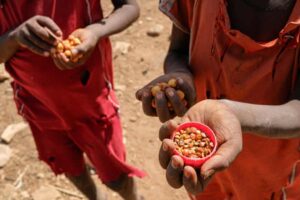
The grain stores are empty in the village of Tseykeme, where eight-year-old Gebremichael and his little brother, Gebreyohannes, spend their afternoons collecting small orange berries from the trees behind their home. The branches are too thorny to climb, so they knock down the berries by throwing stones.
Nothing goes to waste. After eating the flesh, they grind down the pits to get to the seeds inside. Each handful is enough to stave off hunger for a few more hours.
“We’ve been picking them for the last month,” says Abadi Adane, the boys’ father. “After they are finished, I don’t know what we will eat.”
The family planted their small patch of land in June, but the rains did not come and nothing grew. They survived for several months by selling their livestock. When that cash dried up, they turned to neighbours for donations of cups of grain. Now, though, no one has anything left to give.
Conditions are similar across this part of Ethiopia’s northern Tigray region, where stone farmsteads are overlooked by mountains with sheer red cliffs. The drought has turned the area into a dust bowl. Its gravelly fields are full of the stunted remains of dead crops.
“Every day we think about where to get food,” says Tsilaley Abraley, a single mother of six, who lives next door to Abadi. “We are always hungry.”
The drought is one of the worst in recent memory, but it is just the latest crisis to hit Tigray. The rains failed in the middle of a suspension of aid, introduced by the US and the United Nations in mid-March over a huge scheme to steal humanitarian grain by Ethiopian officials. The pause was extended to the rest of Ethiopia in June when the theft was discovered to be nationwide.
At the time, sorely needed food was only just starting to enter Tigray after a devastating two-year civil war. During the conflict, the government turned off Tigray’s internet and blocked aid trucks from entering, a strategy that prompted UN experts to accuse it of using starvation as a weapon of war.
